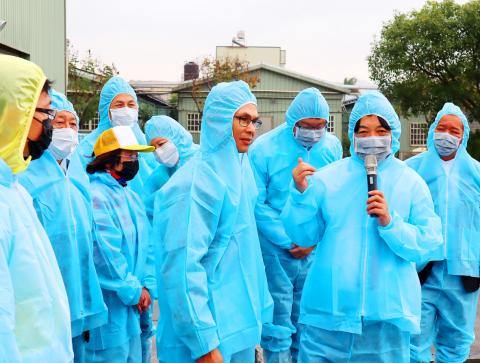Premier William Lai (賴清德) yesterday inspected the disposal of leftover pig food at a hog farm in Taichung and called on farmers and all Taiwanese to join hands to guard against African swine fever.
The government has been stepping up measures against the disease since China reported its first infection in August and illegal Chinese pork imports continue to be intercepted by customs officials.
Following President Tsai Ing-wen’s (蔡英文) visit to Yunlin County hog farms on Saturday, Lai yesterday visited Rueising livestock farm in Cingshuei District (清水) to inspect processes meant to reduce the chances of infection.

Photo: Ou Su-mei, Taipei Times
When foot-and-mouth disease reached Taiwan in 1997, the nation suffered economic losses exceeding NT$170 billion (US$5.5 billion at today’s exchange rate) and culled more than 4 million pigs, leaving a scar on the domestic hog industry, Lai said.
If African swine fever enters the nation, its impact might be more severe than foot-and-mouth disease, given that it can be transmitted in numerous ways and survive in frozen pork for up to 1,000 days and in refrigerated pork for 100 days, he said.
Without a vaccine or cure available, the disease might ruin the domestic hog industry, which has an annual revenue of more than NT$200 billion, Council of Agriculture (COA) Deputy Minister Lee Tui-chih (李退之) said, calling on people to protect the famous Taiwanese dish rice with braised pork and other pork dishes.
“Disease prevention should be considered a battle,” and every single livestock farm is like a castle defending the front line, Lai said.
Many Taiwanese work on pig farms in China, so they might carry the virus into the nation, he said, urging farmers to maintain required quarantine measures and control the movement of personnel, vehicles and equipment on farms.
Food is one of the virus’ main transmission channels, but it can be eradicated if leftovers are heated to 90°C for one hour before being fed to pigs, he said.
Farmers without heating devices can use fodder instead of leftovers and the government would provide subsidies for such a switch, Lai said.
The nation has 2,045 hog farms that use leftovers to feed pigs, while the council is helping 67 farms without heating devices to switch to fodder, COA Acting Minister Chen Chi-chung (陳吉仲) said on Saturday while accompanying Tsai in Yunlin.
Lai asked local governments to set up standard procedures for burying pigs in preparation for the possible arrival of the disease.
The number of dead pigs might exceed the total capacity of incinerators and disposal firms, he said.
Additional reporting by CNA

Chinese Nationalist Party (KMT) Chairman Eric Chu (朱立倫), spokeswoman Yang Chih-yu (楊智伃) and Legislator Hsieh Lung-chieh (謝龍介) would be summoned by police for questioning for leading an illegal assembly on Thursday evening last week, Minister of the Interior Liu Shyh-fang (劉世芳) said today. The three KMT officials led an assembly outside the Taipei City Prosecutors’ Office, a restricted area where public assembly is not allowed, protesting the questioning of several KMT staff and searches of KMT headquarters and offices in a recall petition forgery case. Chu, Yang and Hsieh are all suspected of contravening the Assembly and Parade Act (集會遊行法) by holding

PRAISE: Japanese visitor Takashi Kubota said the Taiwanese temple architecture images showcased in the AI Art Gallery were the most impressive displays he saw Taiwan does not have an official pavilion at the World Expo in Osaka, Japan, because of its diplomatic predicament, but the government-backed Tech World pavilion is drawing interest with its unique recreations of works by Taiwanese artists. The pavilion features an artificial intelligence (AI)-based art gallery showcasing works of famous Taiwanese artists from the Japanese colonial period using innovative technologies. Among its main simulated displays are Eastern gouache paintings by Chen Chin (陳進), Lin Yu-shan (林玉山) and Kuo Hsueh-hu (郭雪湖), who were the three young Taiwanese painters selected for the East Asian Painting exhibition in 1927. Gouache is a water-based

Taiwan would welcome the return of Honduras as a diplomatic ally if its next president decides to make such a move, Minister of Foreign Affairs Lin Chia-lung (林佳龍) said yesterday. “Of course, we would welcome Honduras if they want to restore diplomatic ties with Taiwan after their elections,” Lin said at a meeting of the legislature’s Foreign Affairs and National Defense Committee, when asked to comment on statements made by two of the three Honduran presidential candidates during the presidential campaign in the Central American country. Taiwan is paying close attention to the region as a whole in the wake of a

OFF-TARGET: More than 30,000 participants were expected to take part in the Games next month, but only 6,550 foreign and 19,400 Taiwanese athletes have registered Taipei city councilors yesterday blasted the organizers of next month’s World Masters Games over sudden timetable and venue changes, which they said have caused thousands of participants to back out of the international sporting event, among other organizational issues. They also cited visa delays and political interference by China as reasons many foreign athletes are requesting refunds for the event, to be held from May 17 to 30. Jointly organized by the Taipei and New Taipei City governments, the games have been rocked by numerous controversies since preparations began in 2020. Taipei City Councilor Lin Yen-feng (林延鳳) said yesterday that new measures by